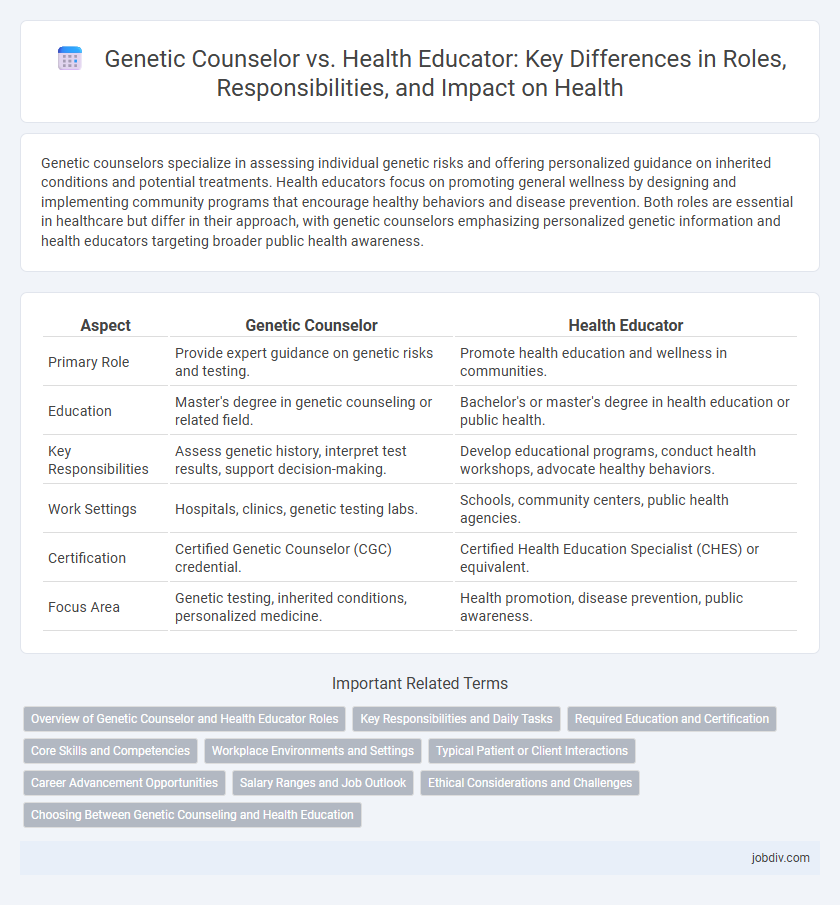Genetic counselors specialize in assessing individual genetic risks and offering personalized guidance on inherited conditions and potential treatments. Health educators focus on promoting general wellness by designing and implementing community programs that encourage healthy behaviors and disease prevention. Both roles are essential in healthcare but differ in their approach, with genetic counselors emphasizing personalized genetic information and health educators targeting broader public health awareness.
Table of Comparison
| Aspect | Genetic Counselor | Health Educator |
|---|---|---|
| Primary Role | Provide expert guidance on genetic risks and testing. | Promote health education and wellness in communities. |
| Education | Master's degree in genetic counseling or related field. | Bachelor's or master's degree in health education or public health. |
| Key Responsibilities | Assess genetic history, interpret test results, support decision-making. | Develop educational programs, conduct health workshops, advocate healthy behaviors. |
| Work Settings | Hospitals, clinics, genetic testing labs. | Schools, community centers, public health agencies. |
| Certification | Certified Genetic Counselor (CGC) credential. | Certified Health Education Specialist (CHES) or equivalent. |
| Focus Area | Genetic testing, inherited conditions, personalized medicine. | Health promotion, disease prevention, public awareness. |
Overview of Genetic Counselor and Health Educator Roles
Genetic counselors assess individual and family risk for inherited conditions by analyzing genetic information and providing specialized guidance on testing and prevention. Health educators develop and implement programs aimed at promoting wellness and preventing disease, focusing on behavior change and community outreach. Both roles emphasize patient education but differ in their scope, with genetic counselors centered on genetic risk assessment and health educators addressing broader public health initiatives.
Key Responsibilities and Daily Tasks
Genetic counselors assess family history and genetic information to guide patients on inherited conditions and risks, providing personalized risk assessments and genetic testing interpretation. Health educators design and implement community programs to promote wellness, develop educational materials, and facilitate workshops that encourage healthy behaviors. Both roles require strong communication skills, but genetic counselors focus on individualized medical guidance while health educators aim to improve public health through education.
Required Education and Certification
Genetic counselors typically require a master's degree in genetic counseling or a related field, alongside board certification from the American Board of Genetic Counseling (ABGC). Health educators generally hold a bachelor's degree in health education or health promotion, with many obtaining the Certified Health Education Specialist (CHES) credential for professional certification. Both roles demand specialized education and certification to ensure expertise in their respective health domains.
Core Skills and Competencies
Genetic counselors possess advanced expertise in medical genetics, risk assessment, and patient communication, enabling them to interpret genetic test results and provide personalized health guidance. Health educators excel in designing and implementing community-based programs, focusing on behavior change theories, public health principles, and effective communication strategies to promote wellness. Both roles require strong interpersonal skills, cultural competence, and the ability to translate complex medical information into understandable advice tailored to diverse populations.
Workplace Environments and Settings
Genetic counselors primarily work in clinical settings, such as hospitals, medical centers, and specialized genetic clinics, where they provide personalized risk assessments and guidance on hereditary conditions. Health educators are found across diverse environments including community health organizations, schools, corporate wellness programs, and public health agencies, focusing on designing and implementing educational strategies to promote healthy behaviors. Both roles require collaboration with healthcare professionals but differ in patient interaction intensity and educational scope within their respective workplace settings.
Typical Patient or Client Interactions
Genetic counselors specialize in guiding patients through complex genetic information to assess inherited health risks and support decision-making for conditions like cancer or rare diseases. Health educators primarily interact with diverse populations by designing and delivering programs that promote wellness and prevent chronic diseases through behavior change strategies. Both roles involve personalized communication, but genetic counselors focus on individual risk assessment, while health educators emphasize community-wide health promotion.
Career Advancement Opportunities
Genetic counselors typically advance by gaining specialized certifications and engaging in research or clinical leadership roles within medical genetics, enhancing their expertise in patient risk assessment and personalized medicine. Health educators often progress by obtaining advanced degrees such as a master's in public health and taking on positions that involve program management, policy development, or community health leadership. Both careers offer pathways to influence public health outcomes, but genetic counselors tend to focus on individualized care while health educators emphasize population-wide education and prevention strategies.
Salary Ranges and Job Outlook
Genetic counselors have a median annual salary of approximately $85,000, with job growth projected at 27% from 2022 to 2032, reflecting a high demand in personalized medicine and genomics. Health educators earn a median salary around $60,000 annually, with a job outlook growth rate of about 17% over the same period, driven by increasing public health awareness and chronic disease prevention initiatives. Salary ranges vary widely based on location, experience, and education, with genetic counselors typically commanding higher pay due to specialized training and certification requirements.
Ethical Considerations and Challenges
Genetic counselors navigate complex ethical considerations such as patient confidentiality, informed consent, and the psychological impact of genetic information, often addressing potential discrimination and familial implications. Health educators face challenges in providing accurate, culturally sensitive information while ensuring equitable access to health resources and maintaining patient autonomy. Both professionals must uphold ethical standards that respect individual rights and promote health literacy without imposing biases.
Choosing Between Genetic Counseling and Health Education
Choosing between genetic counseling and health education depends on your interest in specialized genetic risk assessment versus broader public health promotion. Genetic counselors analyze complex genetic information to guide patients in managing inherited conditions, while health educators develop strategies to improve community wellness through lifestyle changes and preventive care. Evaluating your passion for individualized patient support versus community-focused health initiatives will help determine the best career path.
Genetic Counselor vs Health Educator Infographic

 jobdiv.com
jobdiv.com